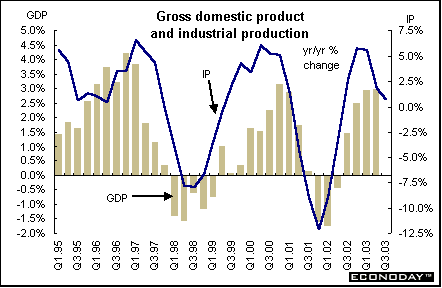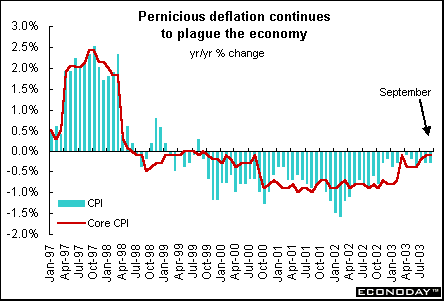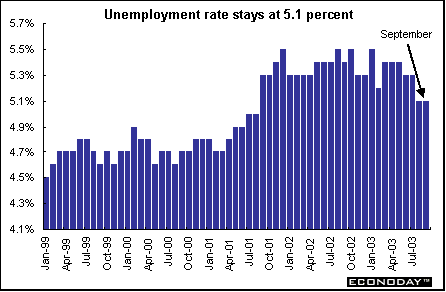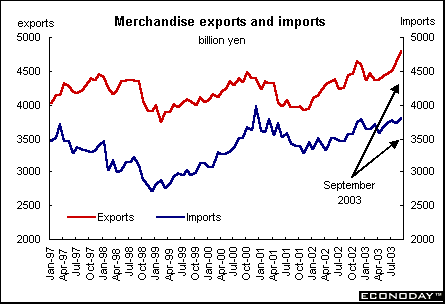

|
Gross domestic product and industrial production - The economy was in recession (as measured by year-over-year gross domestic product) from the second quarter of 2001 to the third quarter of 2002. However, key sectors of the economy have been depressed even longer. There are signs that the economy might be stabilizing, but this has been said before. The turn is very much reliant on the U.S. recovery and increasing export sales to the United States and elsewhere. Domestically, with deflation firmly entrenched, there is no incentive for consumers to buy because prices continue to fall. And with unemployment near its post-war peak, there is little incentive to spend.
Japan has been plagued by dismal economic performance for 10 years. Consumption is stagnant and business investment has languished. But now the economy has expanded for 4 quarters when compared with the previous year. And second quarter growth outpaced other members of the Group of Seven countries. However, sizeable bad debts and the growing number of bankruptcies, especially in the construction industry, continue to trouble the economy while bad loans continue to plague banks. Prime Minister Kuizumi continues to attempt to tackle the bad debt problem but has had difficulty in getting government bureaucrats to cooperate. Deflation - Declining prices remain a serious problem. Many companies - over 2,000 of Japan's 3,700 listed businesses - are not investing but paying down their debts despite interest rates that are virtually zero. The goal is to clean up their balance sheets, which were thrown into disarray by falling asset prices. For those who have borrowed, deflation is a nightmare because the burden of debt becomes heavier as time passes. It also creates awful problems for the banks, and helps explain why they are in such dire straits. For consumers, deflation is a delight: the purchasing power of money grows more valuable when it is not spent. But that encourages consumers to save, not spend, and makes it more difficult for debts to be repaid.
Unemployment - The unemployment rate slipped to 5.1 percent in August and remained there in September after hitting a record 5.5 percent rate in January, a post-war record. However, many analysts believe the figure understates the actual unemployment picture because it excludes those too discouraged to register. Major firms have been laying off workers in droves and the number of bankruptcies last year had been surpassed only once since the end of World War II, in 1984.
The unemployment rate hints that the aggressive job cutting announced by many Japanese companies is continuing, although many workers continue to be shifted to non-consolidated subsidiaries or especially set-up companies. Many of the cuts have been made at overseas operations, reflecting the cultural reluctance to dismiss domestic staff in Japan. Employees at larger companies generally stay with the same firm throughout their careers. Merchandise trade imports and exports - Japan is not particularly open to foreign trade. As a percentage of GDP, the value of Japan's 2001 two way foreign trade was just 16.8 percent while in Germany, for example, was 57 percent. The closed nature of Japan's economy is also apparent in comparisons with other countries in Asia such as China, which saw foreign trade reach 42.4 percent of GDP. This is largely owing to official and unofficial restrictions on merchandise imports. These remain in place despite pressure from the United States and other trading partners in order to protect less efficient sectors of the economy. This lack of openness to foreign trade has often been cited as one of the reasons for the persistence of the structural problems in the country's economy in general and the poor productivity of companies in the non-tradable sectors in particular.
|
Currency • Bank of Japan • Equities Markets



